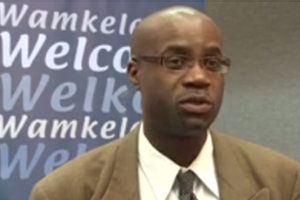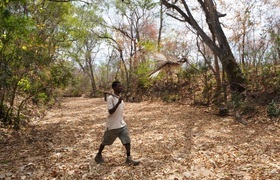Multi-million-rand drug and vaccine partnership will grow African health innovation
26 January 2014 | Story by Newsroom
South African drug and vaccine researchers and health innovators are smiling.
On 21 January UCT and the South African Medical Research Council (MRC) announced a R370 million biotechnology partnership to develop new medicines, vaccines and other biotechnologies to combat HIV/AIDS, TB and malaria, Africa's big killers.
The funding and support partners are the Bill and Melinda Gates Foundation and the Departments of Science and Technology (DST) and Health.
The announcement was made at the MRC's Tygerberg offices and the development will provide a significant fillip to local health innovation and the bio-economy.
The partnership integrates existing role players '“ government, academia, industry - into a co-ordinated system, each with specific roles in drug and vaccine discovery.
It will support two distinct programmes, one involving UCT directly.
Two programmes
In the first programme, researchers from across South Africa will compete for funding from the MRC's Strategic Health Innovation Partnerships (SHIP) earmarked for AIDS and TB vaccine development. This initiative has received R125 million from the Bill and Melinda Gates Foundation, R130 million from the DST and R60 million from the Department of Health.
The second programme is a partnership between the Bill and Melinda Gates Foundation, SHIP and UCT, through the Drug Discovery & Development Centre (H3-D), with its Director, Professor Kelly Chibale, as Principal Investigator and Project Director.
H3-D is Africa's first integrated modern drug discovery and development centre whose objective is to deliver drug candidates for clinical development. In addition to R50 million funding from SHIP and the Technology Innovation Agency, H3-D will receive R55 million from the Bill and Melinda Gates Foundation over five years for this work.
H3-D has already delivered promising results in its short history. In 2012 H3-D and the Medicines for Malaria Venture discovered a novel chemical compound with the potential to impact both malaria control and eradication. The clinical candidate, MMV390048, will enter Phase 1 human clinical trials at Groote Schuur Hospital this year.
Capacity development
While life-saving drugs, vaccines and technology discovery is at the heart of the news, the partnerships will fulfil a longer term goal: to develop a critical mass of top-flight South African scientists in the field, able to compete at high international levels.
The partnership also harnesses the collective skills and research networks in and outside South Africa and will be led by local scientists, backed by the South African government's Departments of Science and Technology (DST), and Health.
Funding from government and the Bill and Melinda Gates Foundation has been the partnership's lifeblood. As the MRC noted, the South Africa medical research sector, is "severely under-funded".
African science solutions
Speaking at the MRC yesterday, Acting Vice-Chancellor Professor Thandabantu Nhlapo said the new partnerships reflected UCT's own vision of internationalisation through an Afropolitan niche.
"We believe our partnering with the Bill and Melinda Gates Foundation, the MRC and government helps us develop Africa-generated solutions to African problems. At the southern tip of Africa, UCT could be the gateway to this, a link between the global North and South."
He said that UCT's Drug Discovery Centre (H3-D) showed that research not only created new knowledge but new jobs, career opportunities, and infrastructure - and reversed the brain drain.
He added: "It's exciting to come and work in Africa."
Story by Helen Swingler. Image by Michael Hammond.
 This work is licensed under a Creative Commons Attribution-NoDerivatives 4.0 International License.
This work is licensed under a Creative Commons Attribution-NoDerivatives 4.0 International License.
Please view the republishing articles page for more information.










